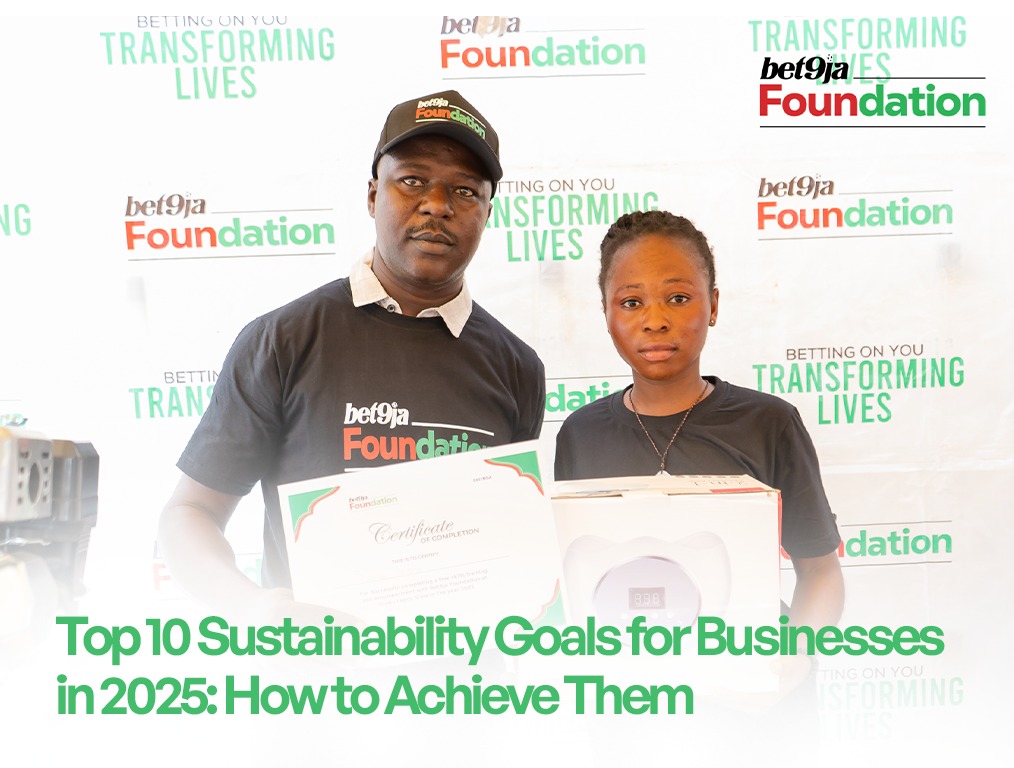Top 10 Sustainability Goals for Businesses in 2025: How to Achieve Them
Sustainability is no longer optional for businesses. Companies prioritising sustainability contribute to a healthier planet, enhance their brand reputation, attract customers, and comply with increasing regulations. For organisations like the Bet9ja Foundation, sustainability is more than a trend; it is a responsibility. So, what should businesses focus on in 2025? Here are ten sustainability goals and actionable steps to achieve them.
Why Sustainability Goals Matter for Businesses in 2025
Sustainability is now a key driver of long-term success. Businesses that invest in sustainable practices gain a competitive edge as consumers increasingly favour environmentally and socially responsible brands. Additionally, governments and investors emphasise sustainable business models more, ensuring that companies committed to sustainability thrive in the evolving market landscape.
1. Achieving Net-Zero Emissions
Why It Matters:
With climate change posing an urgent threat, reducing carbon footprints is crucial for environmental sustainability and regulatory compliance.
How to Achieve It:
Transition to renewable energy sources like solar and wind power.
Implement carbon capture and offset initiatives.
Promote energy efficiency within operations.
Partner with sustainability-driven organisations like Bet9ja Foundation to support green initiatives.
2. Embracing Circular Economy Models
Why It Matters:
Reducing waste and promoting the reuse of materials minimises environmental impact and enhances resource efficiency.
How to Achieve It:
Design products using sustainable, recyclable materials.
Implement take-back programs for products at the end of their lifecycle.
Support recycling and upcycling initiatives in local communities.
Collaborate with organisations like the Bet9ja Foundation to develop sustainability education programs.
Related Posts:
13 Educational Goals to Inspire Success (+ Tips to Achieve Them)
Top 4 Youth Development Initiatives Transforming Nigeria
3. Strengthening Sustainable Supply Chains
Why It Matters:
Ethical and sustainable sourcing ensures environmental protection and fair labour practices.
How to Achieve It:
Source raw materials from ethical and eco-friendly suppliers.
Use blockchain technology for enhanced transparency in supply chain management.
Partner with organisations advocating for fair trade and sustainability.
Conduct supplier audits to ensure compliance with eco-friendly practices.
4. Advancing Diversity, Equity, and Inclusion (DEI)
Why It Matters:
A diverse and inclusive workforce drives innovation, employee satisfaction, and social equity.
How to Achieve It:
Implement inclusive hiring practices.
Offer leadership and mentorship programs for underrepresented groups.
Establish workplace policies promoting diversity and equal opportunity.
Support initiatives that empower marginalised communities.
Read More:
How to Write a Winning Grant Proposal (+ Free Template)
Top 5 Grants for Women Entrepreneurs in 2025 (How to Qualify & Apply)
5. Enhancing Water Stewardship
Why It Matters:
Water is a finite resource, and responsible management is critical to preventing shortages and ensuring sustainability.
How to Achieve It:
Implement water recycling and conservation measures in operations.
Invest in technologies that reduce water waste.
Collaborate with local communities to promote clean water access.
Support Bet9ja Foundation’s community-based water projects.
6. Protecting Biodiversity
Why It Matters:
Preserving ecosystems ensures the protection of wildlife and maintains a balanced environment.
How to Achieve It:
Participate in reforestation and afforestation programs.
Implement eco-friendly land-use practices.
Support conservation efforts and wildlife protection.
Partner with NGOs focused on environmental sustainability.
You Might Also Like:
Exploring the Different Types of CSR & Their Impact on Communities
The Top 10 Fully Funded Scholarships for Undergraduate Students in 2025
7. Innovating Sustainability Reporting
Why It Matters:
Transparent sustainability reporting builds trust, accountability, and compliance with regulatory requirements.
How to Achieve It:
Adopt ESG (Environmental, Social, Governance) reporting standards.
Utilise AI-driven analytics to track sustainability performance.
Publish sustainability reports for stakeholders.
Partner with institutions advocating for sustainability transparency.
8. Investing in Green Technology
Why It Matters:
Technology is a major driver of sustainable solutions, reducing energy consumption and waste.
How to Achieve It:
Invest in renewable energy projects.
Utilise AI and data analytics to optimise energy use.
Encourage the adoption of electric and low-emission vehicles.
Support tech startups focused on sustainability solutions.
You Might Be Interested In:
The Role of Non-Governmental Organizations (NGOs) in Nigeria’s Development
The Benefits of Volunteer Work: How Giving Back Can Change Lives
9. Promoting Sustainable Consumer Behavior
Why It Matters:
Educating consumers on sustainability fosters responsible consumption and long-term change.
How to Achieve It:
Launch sustainability awareness campaigns.
Develop and market eco-friendly products.
Encourage responsible consumption through incentives.
Partner with organisations like Bet9ja Foundation to drive community engagement.
10. Engaging with Communities
Why It Matters:
Strong community ties ensure businesses contribute positively to society while driving sustainable development.
How to Achieve It:
Invest in corporate social responsibility (CSR) initiatives.
Support education and skill development programs in local areas.
Sponsor sports and youth empowerment projects.
Work with Bet9ja Foundation to create impactful social programs.
How Bet9ja Foundation Supports Sustainability Goals
The Bet9ja Foundation is dedicated to promoting sustainability and creating a lasting impact in Nigeria. Through various initiatives, the foundation actively supports businesses and communities in achieving sustainability goals.
Environmental Conservation
Solar-Powered Street Lighting: Projects like Mowe Solar Street Light and Light Up Lagelu Oyo provide solar-powered streetlights, reducing reliance on non-sustainable power sources.
Waste Management Initiatives: The Edo Waste Disposal Donation project supports proper waste disposal in markets and public spaces, encouraging responsible waste management.
Community Engagement
Community Awareness Programs: Initiatives like the Ago Iwoye Community Awareness event educate communities on sustainable practices and provide household equipment.
Empowerment Programs: Projects such as Badagry Olorunda Empowerment equip individuals with valuable skills, fostering economic and social sustainability.
Healthcare and Infrastructure
Health Facility Upgrades: The Mowe Upgrade of Health Facility project includes donations of solar lights, medical equipment, and resources to strengthen sustainable healthcare infrastructure.
The Bet9ja Foundation is making a meaningful impact by supporting sustainability-driven businesses and community initiatives. Read our impact report.


